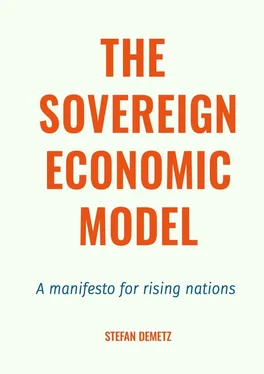Each rule change produces winners and losers. If a government implements economic policies favoring the wealth creation KPI, there will be a set of winners and losers.
The winners
• People will win as increasing employment and wider wealth distribution give them a more comfortable lifestyle.
• Governments will win as increased production brings greater tax revenue and consequently more well-balanced budgets.
• Agriculture, infrastructure, industry, and high tech will win as they will be the net receivers of government attention, subsidies, and lower taxes.
• The service industry will win as more people will have surplus wealth to spend on a variety of services, such as vacations, entertainment, and personal care.
The losers
• Companies relying on rent-seeking businesses will lose out against government.
• Financial services will lose as unproductive investments and mere accumulation will be curbed.
• Products and services promoting unproductive activities will be restricted.
• Economic activities with high social costs will be regulated strictly. Examples:
• Taxation of sodas and junk food, coupled with a de-taxation of healthy or less unhealthy foods
• Taxation of ecologically polluting materials
Economic policy creation and changes must consider potential winners and losers. A government can, with prior notice and support, steer the businesses in new directions.
How to Apply the Sovereign Economic Model by Level of Development
The Sovereign Economic Model contains concepts that have usually been applied in developed nations when they were developing and emerging countries themselves. Most countries have had to protect their markets, such as the US at the end of the 19th and beginning of the 20th centuries; most European countries after World War II; Japan and South Korea slightly later; and many countries in Africa and Latin America in the 1960s and 1970s when, after being colonies, they became independent.
Countries in the developing phase should focus on these priorities:
• Agriculture, natural resources, and infrastructure
• Low-to-medium-technology industry
• One high-tech industry as a national priority
Emerging countries should ponder the following policies:
• Maintain the focus on agriculture, natural resources, and infrastructure.
• Increase focus on the high-value medium-high technology industry.
• Focus on at least one high-value high-tech industry as a national priority.
• Start focusing on the knowledge economy.
Even developed nations, as they stand, have not completed their evolution curve. Many argue that they have started a regression in the past decade, like a playground swing in a park hitting its peak below potential, then stopping and moving backwards. Over-financialization has crept in, and the focus on their core industries and wealth-creating economic sectors has been lost. Speculative investments and other unproductive allocations of money have created more industries of hype than ever. The valuation of assets is wrongly given a higher priority than production, employment, and profits. Government policies and national economic KPIs have changed to achieve quick Pyrrhic victories in perception, but not substance or progress. The toxic addiction to debt, especially long-term debt, is sapping wealth as government interest payments. Unfortunately, debt produces a near-zero percentage of GDP increase and no wealth. In many companies with legendary heritage, products have been watered down and their intrinsic quality and value characteristics flushed out to increase sales and maximize production. The management of developed countries and their business itself is being distracted by ever-increasing marginal issues and useless new fads. Actions of management are big announcements, costs, and time wasted, but without concrete changes or results moving the economic wagon forward. Inefficiencies have crept into the system through outdated infrastructure, outdated processes, and outdated systemic operators, both government and connected business. Bureaucracy and red tape in many countries still require people to transport paperwork in person. People need to visit five different agencies in five different offices during office hours instead of communicating through an online system, which can process such data in a few seconds or minutes at any time of day or night. Education systems have softened to adapt to these new realities instead of insisting on meritocracy and improving the academic curricula, and levels have been lowered by the Bologna Process and Common Core curricula. Rigorous academic tradition was thus demoted to let anyone take part instead of maintaining rigor through an academic selection process.
To roll back, most countries need to take stock and refocus on the core systemic issues of their economies. Cures for rotting economies are needed. It is hard to take stock of bad habits and reassess priorities, but it needs to be done. A list of action steps will need to be prepared and started to change the status quo and introduce new best practices. The following might be some of these steps:
• Increase speed and efficiency of government services for business and people.
• Remove inefficient and unproductive capital allocations from the market.
• Return to conservative economic policies with frugal use of debt.
• Change economic KPIs and steer government support toward them.
• Rebuild infrastructure to include the latest technologies.
• Keep the focus on wealth-generating economic sectors: agriculture, natural resources, infrastructure, industry, and the knowledge economy.
• Return the focus to high-value, high-wealth industry sectors.
• Focus on at least one high-tech industry as a national priority.
• Revert the education system to old-style meritocracy, but implement new-style curricula to support the wealth-creating industry sectors first.
Depending on the stage of development and structure of their economy, countries need to implement economic policies that benefit their real economic growth.
Clarity of Vision and Policies Is the Key
As changes occur, communication of such policies needs to occur in advance to spell out the vision, and the rules need to be clear and detailed. It should function similar to a car’s turn signals, which indicate the direction the car will take in the road and future ahead. A country doing just that is China. Its five-year plan programmatic document perfectly delineates the country’s vision, directions, and action plan in the years ahead. By taking this step, businesses can avoid being unprepared and may even ask for help to align themselves with the new rules. Clarity of vision and clear communication are essential to decrease criticisms and uncertainty.
That which is not good for the beehive cannot be good for the bees.
– Marcus Aurelius, Roman emperor and philosopher, AD 161—180
State Capitalism as Guided Capitalism
State capitalism is usually wrongly associated with communism. In that system, the state owns any type of business activity with central planning of labor and input/output. Communism has been shown as effective only in certain situations with heavy crises or a war economy. In that context, the state needed to direct all resources and lots of production in a predetermined direction, such as rearmament or postwar recovery and reconstruction. Mostly forgotten is the use of state capitalism in the post-war recovery of Europe and East Asia after World War II. Then, state-led development corporations and state-owned enterprises (SOEs) rebuilt economies ravaged by war.
Читать дальше












